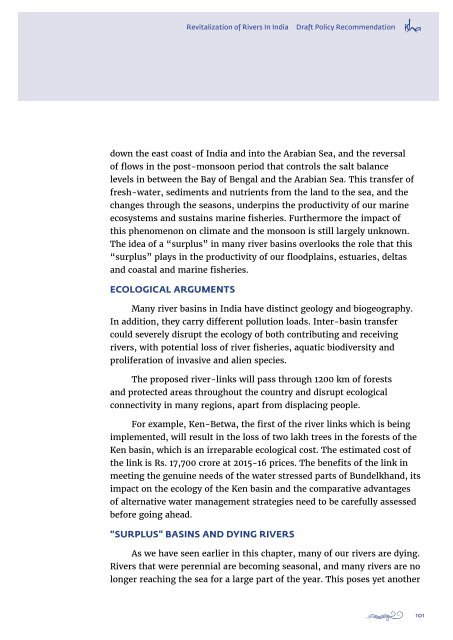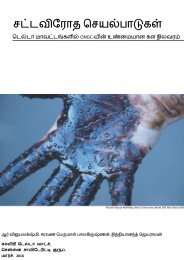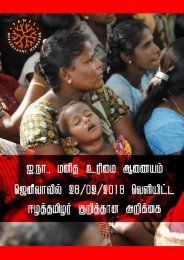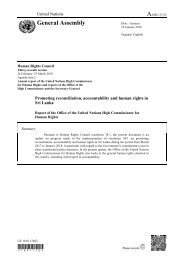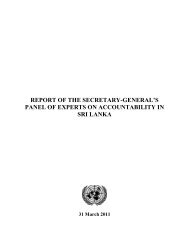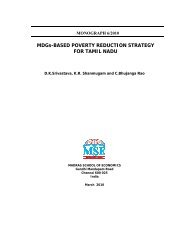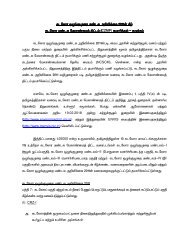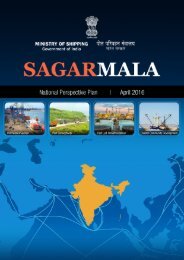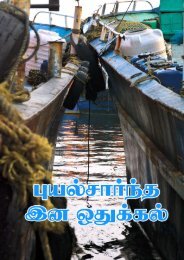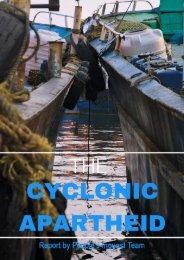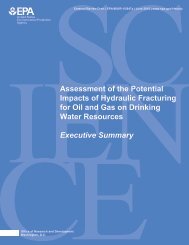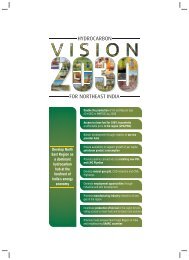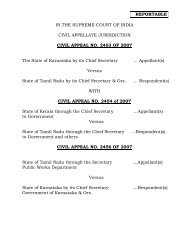- Page 2 and 3:
REVITALIZATION OF RIVERS IN INDIA D
- Page 4 and 5:
Preface Nadi Stuti Bharatam Mahabha
- Page 6 and 7:
Preface My engagement with mountain
- Page 8 and 9:
has driven our farmers to a corner
- Page 10:
REVITALIZATION OF RIVERS IN INDIA D
- Page 13 and 14:
Revitalization of Rivers In India D
- Page 15 and 16:
Revitalization of Rivers In India D
- Page 17 and 18:
Revitalization of Rivers In India D
- Page 19 and 20:
Revitalization of Rivers In India D
- Page 21 and 22:
Revitalization of Rivers In India D
- Page 23 and 24:
22
- Page 25 and 26:
Revitalization of Rivers In India D
- Page 27 and 28:
Revitalization of Rivers In India D
- Page 29 and 30:
Revitalization of Rivers In India D
- Page 31 and 32:
30
- Page 33 and 34:
Revitalization of Rivers In India D
- Page 35 and 36:
34
- Page 37 and 38:
Revitalization of Rivers In India D
- Page 39 and 40:
Revitalization of Rivers In India D
- Page 41 and 42:
Revitalization of Rivers In India D
- Page 43 and 44:
Revitalization of Rivers In India D
- Page 45 and 46:
Revitalization of Rivers In India D
- Page 47 and 48:
Revitalization of Rivers In India D
- Page 49 and 50:
Revitalization of Rivers In India D
- Page 51 and 52: Revitalization of Rivers In India D
- Page 53 and 54: Revitalization of Rivers In India D
- Page 55 and 56: Revitalization of Rivers In India D
- Page 57 and 58: Revitalization of Rivers In India D
- Page 59 and 60: Revitalization of Rivers In India D
- Page 61 and 62: Revitalization of Rivers In India D
- Page 63 and 64: Revitalization of Rivers In India D
- Page 65 and 66: Revitalization of Rivers In India D
- Page 67 and 68: Revitalization of Rivers In India D
- Page 69 and 70: Revitalization of Rivers In India D
- Page 71 and 72: Revitalization of Rivers In India D
- Page 73 and 74: Revitalization of Rivers In India D
- Page 75 and 76: Revitalization of Rivers In India D
- Page 77 and 78: Revitalization of Rivers In India D
- Page 79 and 80: Revitalization of Rivers In India D
- Page 81 and 82: Revitalization of Rivers In India D
- Page 83 and 84: Revitalization of Rivers In India D
- Page 85 and 86: Revitalization of Rivers In India D
- Page 87 and 88: Revitalization of Rivers In India D
- Page 89 and 90: Revitalization of Rivers In India D
- Page 91 and 92: Revitalization of Rivers In India D
- Page 93 and 94: Revitalization of Rivers In India D
- Page 95 and 96: Revitalization of Rivers In India D
- Page 97 and 98: Revitalization of Rivers In India D
- Page 99 and 100: Revitalization of Rivers In India D
- Page 101: Revitalization of Rivers In India D
- Page 105 and 106: Revitalization of Rivers In India D
- Page 107 and 108: Revitalization of Rivers In India D
- Page 109 and 110: Revitalization of Rivers In India D
- Page 111 and 112: Revitalization of Rivers In India D
- Page 113 and 114: Revitalization of Rivers In India D
- Page 115 and 116: Revitalization of Rivers In India D
- Page 117 and 118: Revitalization of Rivers In India D
- Page 119 and 120: Revitalization of Rivers In India D
- Page 121 and 122: Revitalization of Rivers In India D
- Page 123 and 124: Revitalization of Rivers In India D
- Page 125 and 126: Revitalization of Rivers In India D
- Page 127 and 128: Revitalization of Rivers In India D
- Page 129 and 130: Revitalization of Rivers In India D
- Page 131 and 132: Revitalization of Rivers In India D
- Page 133 and 134: Revitalization of Rivers In India D
- Page 135 and 136: Revitalization of Rivers In India D
- Page 137 and 138: Revitalization of Rivers In India D
- Page 139 and 140: Revitalization of Rivers In India D
- Page 141 and 142: Revitalization of Rivers In India D
- Page 143 and 144: Revitalization of Rivers In India D
- Page 145 and 146: Revitalization of Rivers In India D
- Page 147 and 148: Revitalization of Rivers In India D
- Page 149 and 150: Revitalization of Rivers In India D
- Page 151 and 152: Revitalization of Rivers In India D
- Page 153 and 154:
Revitalization of Rivers In India D
- Page 155 and 156:
Revitalization of Rivers In India D
- Page 157 and 158:
Revitalization of Rivers In India D
- Page 159 and 160:
Revitalization of Rivers In India D
- Page 161 and 162:
Revitalization of Rivers In India D
- Page 163 and 164:
Revitalization of Rivers In India D
- Page 165 and 166:
Revitalization of Rivers In India D
- Page 167 and 168:
Revitalization of Rivers In India D
- Page 169 and 170:
Revitalization of Rivers In India D
- Page 171 and 172:
Revitalization of Rivers In India D
- Page 173 and 174:
Revitalization of Rivers In India D
- Page 175 and 176:
Revitalization of Rivers In India D
- Page 177 and 178:
Revitalization of Rivers In India D
- Page 179 and 180:
Revitalization of Rivers In India D
- Page 181 and 182:
180
- Page 183 and 184:
Revitalization of Rivers In India D
- Page 185 and 186:
Revitalization of Rivers In India D
- Page 187 and 188:
Revitalization of Rivers In India D
- Page 189 and 190:
Revitalization of Rivers In India D
- Page 191 and 192:
Revitalization of Rivers In India D
- Page 193 and 194:
Revitalization of Rivers In India D
- Page 195 and 196:
Revitalization of Rivers In India D
- Page 197 and 198:
Revitalization of Rivers In India D
- Page 199 and 200:
Revitalization of Rivers In India D
- Page 201 and 202:
Revitalization of Rivers In India D
- Page 203 and 204:
Revitalization of Rivers In India D
- Page 205 and 206:
Revitalization of Rivers In India D
- Page 207 and 208:
Revitalization of Rivers In India D
- Page 209 and 210:
Revitalization of Rivers In India D
- Page 211 and 212:
Revitalization of Rivers In India D
- Page 213 and 214:
Revitalization of Rivers In India D
- Page 215 and 216:
Revitalization of Rivers In India D
- Page 217 and 218:
Revitalization of Rivers In India D
- Page 219 and 220:
Revitalization of Rivers In India D
- Page 221 and 222:
Revitalization of Rivers In India D
- Page 223 and 224:
Revitalization of Rivers In India D
- Page 225 and 226:
Revitalization of Rivers In India D
- Page 227 and 228:
Revitalization of Rivers In India D
- Page 229 and 230:
Revitalization of Rivers In India D
- Page 231 and 232:
Revitalization of Rivers In India D
- Page 233 and 234:
Revitalization of Rivers In India D
- Page 235 and 236:
Revitalization of Rivers In India D
- Page 237 and 238:
Revitalization of Rivers In India D
- Page 239 and 240:
Revitalization of Rivers In India D
- Page 241 and 242:
Revitalization of Rivers In India D
- Page 243 and 244:
Revitalization of Rivers In India D
- Page 245 and 246:
Revitalization of Rivers In India D
- Page 247 and 248:
Revitalization of Rivers In India D
- Page 249 and 250:
248
- Page 251 and 252:
Revitalization of Rivers In India D
- Page 253 and 254:
Revitalization of Rivers In India D
- Page 255 and 256:
Revitalization of Rivers In India D
- Page 257 and 258:
Revitalization of Rivers In India D
- Page 259 and 260:
Revitalization of Rivers In India D
- Page 261 and 262:
Revitalization of Rivers In India D
- Page 263 and 264:
Revitalization of Rivers In India D
- Page 265 and 266:
Revitalization of Rivers In India D
- Page 267 and 268:
Revitalization of Rivers In India D
- Page 269 and 270:
Revitalization of Rivers In India D
- Page 271 and 272:
Revitalization of Rivers In India D
- Page 273 and 274:
Revitalization of Rivers In India D
- Page 275 and 276:
Revitalization of Rivers In India D
- Page 277 and 278:
Revitalization of Rivers In India D
- Page 279 and 280:
Revitalization of Rivers In India D
- Page 281 and 282:
Revitalization of Rivers In India D
- Page 283 and 284:
Revitalization of Rivers In India D
- Page 285 and 286:
Revitalization of Rivers In India D
- Page 287 and 288:
Revitalization of Rivers In India D
- Page 289 and 290:
Revitalization of Rivers In India D
- Page 291 and 292:
Revitalization of Rivers In India D
- Page 293 and 294:
Revitalization of Rivers In India D
- Page 295 and 296:
Revitalization of Rivers In India D
- Page 297 and 298:
Revitalization of Rivers In India D
- Page 299 and 300:
Revitalization of Rivers In India D
- Page 301 and 302:
Revitalization of Rivers In India D
- Page 303 and 304:
Revitalization of Rivers In India D
- Page 305 and 306:
Revitalization of Rivers In India D
- Page 307 and 308:
Revitalization of Rivers In India D
- Page 309 and 310:
Revitalization of Rivers In India D
- Page 311 and 312:
Revitalization of Rivers In India D
- Page 313 and 314:
Revitalization of Rivers In India D
- Page 315 and 316:
Revitalization of Rivers In India D
- Page 317 and 318:
Revitalization of Rivers In India D
- Page 319 and 320:
Revitalization of Rivers In India D
- Page 321 and 322:
Revitalization of Rivers In India D
- Page 323 and 324:
Revitalization of Rivers In India D
- Page 325 and 326:
Revitalization of Rivers In India D
- Page 327 and 328:
Revitalization of Rivers In India D
- Page 329 and 330:
Revitalization of Rivers In India D
- Page 331 and 332:
Revitalization of Rivers In India D
- Page 333 and 334:
Revitalization of Rivers In India D
- Page 335 and 336:
Revitalization of Rivers In India D
- Page 337 and 338:
Revitalization of Rivers In India D
- Page 339 and 340:
Revitalization of Rivers In India D
- Page 341 and 342:
Revitalization of Rivers In India D
- Page 343 and 344:
Revitalization of Rivers In India D
- Page 345 and 346:
Revitalization of Rivers In India D
- Page 347 and 348:
Revitalization of Rivers In India D
- Page 349 and 350:
Revitalization of Rivers In India D
- Page 351 and 352:
Revitalization of Rivers In India D
- Page 353 and 354:
Revitalization of Rivers In India D
- Page 355 and 356:
Revitalization of Rivers In India D
- Page 357 and 358:
Revitalization of Rivers In India D
- Page 359 and 360:
Revitalization of Rivers In India D
- Page 361 and 362:
Revitalization of Rivers In India D
- Page 363 and 364:
Revitalization of Rivers In India D
- Page 365 and 366:
Revitalization of Rivers In India D
- Page 367 and 368:
Revitalization of Rivers In India D
- Page 369 and 370:
Revitalization of Rivers In India D
- Page 371 and 372:
Revitalization of Rivers In India D
- Page 373 and 374:
Revitalization of Rivers In India D
- Page 375 and 376:
Revitalization of Rivers In India D
- Page 377 and 378:
Revitalization of Rivers In India D
- Page 379 and 380:
Revitalization of Rivers In India D
- Page 381 and 382:
Revitalization of Rivers In India D
- Page 383 and 384:
Revitalization of Rivers In India D
- Page 385 and 386:
Revitalization of Rivers In India D
- Page 387 and 388:
Revitalization of Rivers In India D
- Page 389 and 390:
Revitalization of Rivers In India D
- Page 391 and 392:
Revitalization of Rivers In India D
- Page 393 and 394:
Revitalization of Rivers In India D
- Page 395 and 396:
Revitalization of Rivers In India D
- Page 397 and 398:
Revitalization of Rivers In India D
- Page 399 and 400:
Revitalization of Rivers In India D
- Page 401 and 402:
Revitalization of Rivers In India D
- Page 403 and 404:
Revitalization of Rivers In India D
- Page 405 and 406:
Revitalization of Rivers In India D
- Page 407 and 408:
Revitalization of Rivers In India D
- Page 409 and 410:
Revitalization of Rivers In India D
- Page 411 and 412:
Revitalization of Rivers In India D
- Page 413 and 414:
Revitalization of Rivers In India D
- Page 415 and 416:
Revitalization of Rivers In India D
- Page 417 and 418:
Revitalization of Rivers In India D
- Page 419 and 420:
Revitalization of Rivers In India D
- Page 421 and 422:
Revitalization of Rivers In India D
- Page 423 and 424:
Revitalization of Rivers In India D
- Page 425 and 426:
Revitalization of Rivers In India D
- Page 427 and 428:
Revitalization of Rivers In India D
- Page 429 and 430:
Revitalization of Rivers In India D
- Page 431 and 432:
Revitalization of Rivers In India D
- Page 433 and 434:
Revitalization of Rivers In India D
- Page 435 and 436:
Revitalization of Rivers In India D
- Page 437 and 438:
Revitalization of Rivers In India D
- Page 439 and 440:
Revitalization of Rivers In India D
- Page 441 and 442:
Revitalization of Rivers In India D
- Page 443 and 444:
Revitalization of Rivers In India D
- Page 445 and 446:
Revitalization of Rivers In India D
- Page 447 and 448:
Revitalization of Rivers In India D
- Page 449 and 450:
Revitalization of Rivers In India D
- Page 451 and 452:
Revitalization of Rivers In India D
- Page 453 and 454:
Revitalization of Rivers In India D
- Page 455 and 456:
Revitalization of Rivers In India D
- Page 457 and 458:
Revitalization of Rivers In India D
- Page 459 and 460:
Revitalization of Rivers In India D
- Page 461 and 462:
Revitalization of Rivers In India D
- Page 463 and 464:
Revitalization of Rivers In India D
- Page 465 and 466:
Revitalization of Rivers In India D
- Page 467 and 468:
Revitalization of Rivers In India D
- Page 469 and 470:
Revitalization of Rivers In India D
- Page 471 and 472:
Revitalization of Rivers In India D
- Page 473 and 474:
Revitalization of Rivers In India D
- Page 475 and 476:
Revitalization of Rivers In India D
- Page 477 and 478:
Revitalization of Rivers In India D
- Page 479 and 480:
Revitalization of Rivers In India D
- Page 481 and 482:
Revitalization of Rivers In India D
- Page 483 and 484:
Revitalization of Rivers In India D
- Page 485 and 486:
Revitalization of Rivers In India D
- Page 487 and 488:
Revitalization of Rivers In India D
- Page 489 and 490:
Revitalization of Rivers In India D
- Page 491 and 492:
Revitalization of Rivers In India D
- Page 493 and 494:
Revitalization of Rivers In India D
- Page 495 and 496:
Revitalization of Rivers In India D
- Page 497 and 498:
Revitalization of Rivers In India D
- Page 499 and 500:
Revitalization of Rivers In India D
- Page 501 and 502:
Revitalization of Rivers In India D
- Page 503 and 504:
Revitalization of Rivers In India D
- Page 505 and 506:
Revitalization of Rivers In India D
- Page 507 and 508:
Revitalization of Rivers In India D
- Page 509 and 510:
Revitalization of Rivers In India D
- Page 511 and 512:
Revitalization of Rivers In India D
- Page 513 and 514:
Revitalization of Rivers In India D
- Page 515 and 516:
Revitalization of Rivers In India D
- Page 517 and 518:
Revitalization of Rivers In India D
- Page 519 and 520:
Revitalization of Rivers In India D
- Page 521 and 522:
Revitalization of Rivers In India D
- Page 523 and 524:
Revitalization of Rivers In India D
- Page 525 and 526:
Revitalization of Rivers In India D
- Page 527 and 528:
Revitalization of Rivers In India D
- Page 529 and 530:
Revitalization of Rivers In India D
- Page 531 and 532:
Revitalization of Rivers In India D
- Page 533 and 534:
Revitalization of Rivers In India D
- Page 535 and 536:
Revitalization of Rivers In India D
- Page 537 and 538:
Revitalization of Rivers In India D
- Page 539 and 540:
Revitalization of Rivers In India D
- Page 541 and 542:
Revitalization of Rivers In India D
- Page 543 and 544:
Revitalization of Rivers In India D
- Page 545 and 546:
Revitalization of Rivers In India D
- Page 547 and 548:
Revitalization of Rivers In India D
- Page 549 and 550:
Revitalization of Rivers In India D
- Page 551 and 552:
Revitalization of Rivers In India D
- Page 553 and 554:
Revitalization of Rivers In India D
- Page 555 and 556:
Revitalization of Rivers In India D
- Page 557 and 558:
Revitalization of Rivers In India D
- Page 559 and 560:
Revitalization of Rivers In India D
- Page 561 and 562:
Revitalization of Rivers In India D
- Page 563 and 564:
Revitalization of Rivers In India D
- Page 565 and 566:
Revitalization of Rivers In India D
- Page 567 and 568:
Revitalization of Rivers In India D
- Page 569 and 570:
Revitalization of Rivers In India D
- Page 571 and 572:
Revitalization of Rivers In India D
- Page 573 and 574:
Revitalization of Rivers In India D
- Page 575 and 576:
Revitalization of Rivers In India D
- Page 577 and 578:
Revitalization of Rivers In India D
- Page 579 and 580:
Revitalization of Rivers In India D
- Page 581 and 582:
Revitalization of Rivers In India D
- Page 583 and 584:
Revitalization of Rivers In India D
- Page 585 and 586:
Revitalization of Rivers In India D
- Page 587 and 588:
Revitalization of Rivers In India D
- Page 589 and 590:
Revitalization of Rivers In India D
- Page 591 and 592:
Revitalization of Rivers In India D
- Page 593 and 594:
Revitalization of Rivers In India D
- Page 595 and 596:
Revitalization of Rivers In India D
- Page 597 and 598:
Revitalization of Rivers In India D
- Page 599 and 600:
Revitalization of Rivers In India D
- Page 601 and 602:
Revitalization of Rivers In India D
- Page 603 and 604:
Revitalization of Rivers In India D
- Page 605 and 606:
Revitalization of Rivers In India D
- Page 607 and 608:
Revitalization of Rivers In India D
- Page 609 and 610:
Revitalization of Rivers In India D
- Page 611 and 612:
Revitalization of Rivers In India D
- Page 613 and 614:
Revitalization of Rivers In India D
- Page 615 and 616:
Revitalization of Rivers In India D
- Page 617 and 618:
Revitalization of Rivers In India D
- Page 619 and 620:
Revitalization of Rivers In India D
- Page 621 and 622:
Revitalization of Rivers In India D
- Page 623 and 624:
Revitalization of Rivers In India D
- Page 625 and 626:
Revitalization of Rivers In India D
- Page 627 and 628:
Revitalization of Rivers In India D
- Page 629 and 630:
Revitalization of Rivers In India D
- Page 631 and 632:
Revitalization of Rivers In India D
- Page 633 and 634:
Revitalization of Rivers In India D
- Page 635 and 636:
Revitalization of Rivers In India D
- Page 637 and 638:
Revitalization of Rivers In India D
- Page 639 and 640:
Revitalization of Rivers In India D
- Page 641 and 642:
Revitalization of Rivers In India D
- Page 643 and 644:
Revitalization of Rivers In India D
- Page 645 and 646:
Revitalization of Rivers In India D
- Page 647 and 648:
Revitalization of Rivers In India D
- Page 649 and 650:
Revitalization of Rivers In India D
- Page 651 and 652:
Revitalization of Rivers In India D
- Page 653 and 654:
Revitalization of Rivers In India D
- Page 655 and 656:
Revitalization of Rivers In India D
- Page 657 and 658:
Revitalization of Rivers In India D
- Page 659 and 660:
Revitalization of Rivers In India D
- Page 661 and 662:
Revitalization of Rivers In India D
- Page 663 and 664:
Revitalization of Rivers In India D
- Page 665 and 666:
Revitalization of Rivers In India D
- Page 667 and 668:
Revitalization of Rivers In India D
- Page 669 and 670:
Revitalization of Rivers In India D
- Page 671 and 672:
Revitalization of Rivers In India D
- Page 673 and 674:
Revitalization of Rivers In India D
- Page 675 and 676:
Revitalization of Rivers In India D
- Page 677 and 678:
Revitalization of Rivers In India D
- Page 679 and 680:
Revitalization of Rivers In India D
- Page 681 and 682:
Revitalization of Rivers In India D
- Page 683 and 684:
Revitalization of Rivers In India D
- Page 685 and 686:
Revitalization of Rivers In India D
- Page 687 and 688:
Revitalization of Rivers In India D
- Page 689 and 690:
Revitalization of Rivers In India D
- Page 691 and 692:
Revitalization of Rivers In India D
- Page 693 and 694:
Revitalization of Rivers In India D
- Page 695 and 696:
Revitalization of Rivers In India D
- Page 697 and 698:
Revitalization of Rivers In India D
- Page 699 and 700:
Revitalization of Rivers In India D
- Page 701 and 702:
Revitalization of Rivers In India D
- Page 703 and 704:
Revitalization of Rivers In India D
- Page 705 and 706:
Revitalization of Rivers In India D
- Page 707 and 708:
Revitalization of Rivers In India D
- Page 709 and 710:
Revitalization of Rivers In India D
- Page 711 and 712:
Revitalization of Rivers In India D
- Page 713 and 714:
Revitalization of Rivers In India D
- Page 715 and 716:
Revitalization of Rivers In India D
- Page 717 and 718:
Revitalization of Rivers In India D
- Page 719 and 720:
Revitalization of Rivers In India D
- Page 721 and 722:
Revitalization of Rivers In India D
- Page 723 and 724:
Revitalization of Rivers In India D
- Page 725 and 726:
Revitalization of Rivers In India D
- Page 727 and 728:
Revitalization of Rivers In India D
- Page 729 and 730:
Revitalization of Rivers In India D
- Page 731 and 732:
Revitalization of Rivers In India D
- Page 733 and 734:
Revitalization of Rivers In India D
- Page 735 and 736:
Revitalization of Rivers In India D
- Page 737 and 738:
Revitalization of Rivers In India D
- Page 739 and 740:
Revitalization of Rivers In India D
- Page 741 and 742:
Revitalization of Rivers In India D
- Page 743 and 744:
Revitalization of Rivers In India D
- Page 745 and 746:
Revitalization of Rivers In India D
- Page 747 and 748:
Revitalization of Rivers In India D
- Page 749 and 750:
Revitalization of Rivers In India D
- Page 751 and 752:
Revitalization of Rivers In India D
- Page 753 and 754:
Revitalization of Rivers In India D
- Page 755 and 756:
Revitalization of Rivers In India D
- Page 757 and 758:
Revitalization of Rivers In India D
- Page 759 and 760:
Revitalization of Rivers In India D
- Page 761:
Revitalization of Rivers In India D


